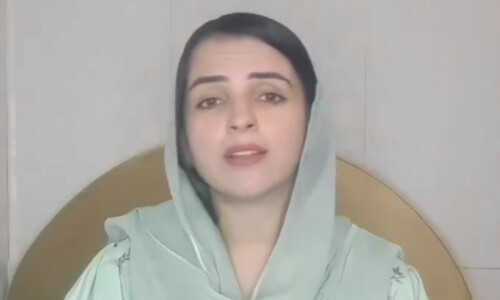ISLAMABAD: The fifth Islamabad Literature Festival (ILF) began on Friday. Some 150 speakers from various countries are taking part in the festival, which will consist of 50 sessions.
The inaugural session began with keynote speeches by A.G Noorani from Mumbai and Arfa Syeda Zehra.
ILF founder Ameena Saiyid and the Oxford University Press, which is hosting the festival, aims to make reading a pleasurable activity for the young and old.
“We are aware that appealing books can entice children into the golden web of readership, promote creativity and imagination and kindle hope for a more inspired and accomplished Pakistani generation,” she said.
ILF co-founder Asif Farrukhi welcomed the audience to the event and said: “The change in weather was the first thing I noticed. I wish you pleasant evenings over the next few days as we focus on books, literature, social and historical issues. The ILF has now firmly taken root and established itself in the local soil, completely contrary to warnings that Islamabad is barren soil as far as culture is concerned.”
Acclaimed literary critic and educationist Arfa Zehra said: “Three things are very dear to me – the first is history, the second is culture and the third is the expression of the first two, language. History is our collective memory, not our collective lament. It is meant to light the way so that the path is never in darkness. Whenever one decides to destroy a nation or a society the easiest way is to desecrate that nation’s collective memory. When the collective memory is desecrated the nation, the institutions and the thought of that nation are debased. All that remains is recalcitrance and that is not sufficient for development. For improvement and development we need to change and history teaches how to change.”
Taking the stage after Ms Zehra, who had expressed concern over the status of the Urdu language, Mr Noorani said: I wish to assure [Ms Zehra] that after a long, long period, Urdu is alive and kicking. I am reminded of an interview given by Ch. Khaliquz Zaman to M. A. Naqvi in 1972.
He said we are now divided into three countries and we are not able to speak to one another but Urdu will survive, for all the suppression of Urdu and I call it and used it in print in India, linguistic genocide. For all that, Urdu cannot be crushed. There is an Urdu channel in Hyderabad called ETV Urdu 24 hours, there are mushairas, qawalli is vibrant and you know very well that any of the Pakistani intellectuals who come to India speak in Urdu and are very much welcomed.”
He added, “With Partition, all is horrors with lies, but the biggest blow was to Urdu tehzeeb and zubaan. Today both India and Pakistan are facing the worst moments in our national history and in our relations. In my country, we have an RSS activist as prime minister and a yogi is the chief minister of the largest state. India is on its way to becoming a Hindu state. In Pakistan, the forces of violence and fundamentalism are very much on the rise.”
The keynote addresses were followed by a performance by Amna Mawaz Khan, one of the few classical dances in Pakistan who specialise in Bharatnatyam.
She dedicated her performance to Mashal Khan, a student beaten to death in Mardan and talked about how no one came to his aid.
She and Nafees Khan performed to Habib Jalib’s zulm rahe aur amn bhi ho as the tribute followed by Tillana, a Bharatnatyam piece by Indu Mitha.
Published in Dawn, April 15th, 2017














































Dear visitor, the comments section is undergoing an overhaul and will return soon.